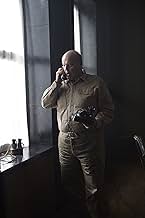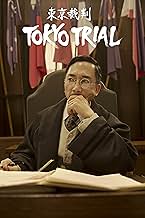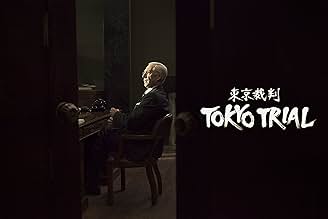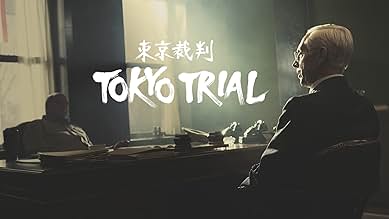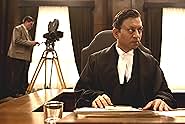Tokyo Trial
- टीवी मिनी सीरीज़
- 2016
- 50 मि
IMDb रेटिंग
7.3/10
2.1 हज़ार
आपकी रेटिंग
अपनी भाषा में प्लॉट जोड़ेंA historical drama that focuses on a decade-long investigation into events in the Pacific during and after WWII.A historical drama that focuses on a decade-long investigation into events in the Pacific during and after WWII.A historical drama that focuses on a decade-long investigation into events in the Pacific during and after WWII.
- पुरस्कार
- 1 जीत और कुल 1 नामांकन
एपिसोड ब्राउज़ करें
फ़ीचर्ड समीक्षाएं
This is a fascinating, well made four-part miniseries. I watched it on Netflix over four days, but it's so good, I can see how one might want to binge watch it. It reminded me of Twelve Angry Men.
In 1946, eleven Allied Judges were appointed to The International Military Tribunal for the Far East (IMTFE), aka Tokyo Trial or Tokyo War Crimes Tribunal. Their job was to try twenty-eight Japanese leaders for conventional war crimes and crimes against humanity. I didn't know anything about this trial.
The participating countries were: Australia, Canada, China, France, British India, the Netherlands, New Zealand, the Philippines, the Soviet Union, the United Kingdom, and the United States. Later a twelfth judge from India was added. These dedicated, but very different men, (yep, all men in those days), had legal and moral clashes with regards to how to stay true to the law, remain impartial, and prevent similar atrocities.
This tribunal would form the foundation of how "war as a crime by individuals" would be judged in the future. It had previously existed only part of the Paris Peace Pact of 1928. They ran into a problem with war crimes being ascribed only to a Nation and not to an individual.
There is infighting, cliques, power struggles, and schisms amongst the judges. Pal and Röling are outspoken in their dissent, which created an interesting narrative. Röling is the main protagonist; we get a glimpse into his creative relationship with German pianist Eta Harich-Schneider.
Many of the accused were found guilty, including former Prime Minister Hideki Tojo.
I listed the judges to keep track of them.
In 1946, eleven Allied Judges were appointed to The International Military Tribunal for the Far East (IMTFE), aka Tokyo Trial or Tokyo War Crimes Tribunal. Their job was to try twenty-eight Japanese leaders for conventional war crimes and crimes against humanity. I didn't know anything about this trial.
The participating countries were: Australia, Canada, China, France, British India, the Netherlands, New Zealand, the Philippines, the Soviet Union, the United Kingdom, and the United States. Later a twelfth judge from India was added. These dedicated, but very different men, (yep, all men in those days), had legal and moral clashes with regards to how to stay true to the law, remain impartial, and prevent similar atrocities.
This tribunal would form the foundation of how "war as a crime by individuals" would be judged in the future. It had previously existed only part of the Paris Peace Pact of 1928. They ran into a problem with war crimes being ascribed only to a Nation and not to an individual.
There is infighting, cliques, power struggles, and schisms amongst the judges. Pal and Röling are outspoken in their dissent, which created an interesting narrative. Röling is the main protagonist; we get a glimpse into his creative relationship with German pianist Eta Harich-Schneider.
Many of the accused were found guilty, including former Prime Minister Hideki Tojo.
I listed the judges to keep track of them.
- Tim Ahern as Major General Myron C. Cramer (United States)
- Paul Freeman as The Honourable Lord William D. Patrick (United Kingdom)
- Serge Hazanavicius as Henri Bernard (France)
- Marcel Hensema as Professor Bert V.A. Röling (Netherlands)
- Jonathan Hyde as President Sir William Webb (Australia)
- Irrfan Khan as Radhabinod Pal (India)
- Stephen McHattie as Edward Stuart McDougall (Canada)
- David Tse as Mei Ju-ao (China)
- Julian Wadham as Sir Erima H. Northcroft (New Zealand)
- Bert Matias as Colonel Delfín Jaranilla (Philippines)
- Kestutis Stasys Jakstas as Major General I.M. Zaryanov (Soviet Union)
- William Hope as John P. Higgins (United States)
This miniseries starts off a little clunky, but any faults of the first episode, are forgotten by the end of the second episode. If it wasn't for one of the other reviewers who abandoned the series after watching just one episode, I would not have made this remark.
The series attempts to present the personalities and professional conduct of each Justice appointed to conduct the trails. It is not revisionist as some of the other reviewers have stated. We have had decades of documentaries about Japan's involvement in WW2, but none have attempted to cover the due judicial process to the extent of Tokyo Trial. And I think I would not have enjoyed the series if it was not dramatised, as I would have turned off to another narrated documentary.
For performances of the actors, the editing, and production are all good, especially from the end of the second episode. There is a lot to take in, I found myself enthralled by the story, and unexpectedly quite emotional at the end. I have worked on translation projects for academic material, related to this subject, but Tokyo Trial has a richer more human story to tell.
The series attempts to present the personalities and professional conduct of each Justice appointed to conduct the trails. It is not revisionist as some of the other reviewers have stated. We have had decades of documentaries about Japan's involvement in WW2, but none have attempted to cover the due judicial process to the extent of Tokyo Trial. And I think I would not have enjoyed the series if it was not dramatised, as I would have turned off to another narrated documentary.
For performances of the actors, the editing, and production are all good, especially from the end of the second episode. There is a lot to take in, I found myself enthralled by the story, and unexpectedly quite emotional at the end. I have worked on translation projects for academic material, related to this subject, but Tokyo Trial has a richer more human story to tell.
Good history, fine acting. The moral nuances become very real as the Justices deliberate. I expect my attorney friends will really like this. For the most part the film succeeds in avoiding black and white characters and draws out the complexities of personalities and values. This is not a thriller, more of a morality play based on real high-stakes deliberations. The casting for General MacArthur was a minus, not because of the acting, there was little meat in the role, but there must be thousands of actors who would look like MacArthur and could handle this role. No one else's likeness was relevant, who knew the judges? But...
I've spent half a century as a professional historian and thirty as an international criminal lawyer studying, recording and engaged in commentaries on the history and jurisprudence of the International Military Tribunal for the Far East. I've also closely studied the records of many, many hundreds of national war crimes trials that followed the Far East and Pacific Conflict, plus other national and international war crimes trials elsewhere from the late nineteenth century to more recent times. The 2 1/2 year Tokyo Trial (IMTFE) was much longer, more complex and covered a more extended period of events than its nine-month international counterpart at Nuremberg. Both of these two trials, however, were 'Class A' war crimes trials, meaning that their central focus was on an alleged conspiracy to plan, prepare, initiate and wage wars of aggression ("Crimes against Peace"). There was plenty on 'Class B/C" offences (violations of the laws and usages of war ("War Crimes" in the usual sense of atrocities against the laws and usages of war) and upon 'Crimes against Humanity' against civilians, but the bulk of those offences were tried in the so-called Minor War Crimes Trials that were held by individual countries and generally in the countries where those crimes had taken place. Only Nuremberg also dealt with Genocide.
This film concentrates on what was considered even at the time as the most important issue, what was called 'the master crime', Crimes against Peace, not only because that was the one thing that set Class A cases apart from others but because there was a deeply flawed general theory that without an aggressive war the other kinds of offences couldn't take place on an organised or systematic basis. But in a more particular sense the importance of this film is that it focusses on the very legality of having a trial concerning 'Crimes against Peace' which behind the scene was questioned by the judges at the Tokyo Trial in ways that didn't gain any traction at all at Nuremberg. The Judges at Nuremberg agreed never to discuss how their deliberations proceeded and how the trial almost collapsed due to the divisions between them. And this is the first time that their struggles over that issue have been aired in a major international film production. what is clear is that they understood that if the view held by the majority did not prevail, all that was achieved at Nuremberg in holding individuals criminally responsible for planning, preparing, initiating and waging wars of aggression would have fallen apart as a new rule of international law. If the couple of dozen defendants in the Tokyo Trial had to pay an heavy price in the process of turning a rule intended to bind states into a rule fit for holding individual leaders criminally responsible even to the point of losing their lives, then that ex post facto lawmaking was considered justifiable by the majority of members of the Tribunal. For others, that was a bridge too far.
Did the majority do the right thing? Judge for yourself. But did the upholding of the Nuremberg precedent really change the world as hoped? Sadly, no: the International Criminal Court has yet to claim its jurisdiction to try such cases. The architects of the most significant post-1945 aggressive wars have escaped justice, not least in the lands of those Members of the Tokyo Tribunal who were most keen to see that jurisdiction bedded down in national and international trials and in the conduct of states towards each other. As for the acting, the direction, the script and the fairness of this account: the film is awesome and as completely accurate as it is possible to be. This mini-series is a masterpiece.
This film concentrates on what was considered even at the time as the most important issue, what was called 'the master crime', Crimes against Peace, not only because that was the one thing that set Class A cases apart from others but because there was a deeply flawed general theory that without an aggressive war the other kinds of offences couldn't take place on an organised or systematic basis. But in a more particular sense the importance of this film is that it focusses on the very legality of having a trial concerning 'Crimes against Peace' which behind the scene was questioned by the judges at the Tokyo Trial in ways that didn't gain any traction at all at Nuremberg. The Judges at Nuremberg agreed never to discuss how their deliberations proceeded and how the trial almost collapsed due to the divisions between them. And this is the first time that their struggles over that issue have been aired in a major international film production. what is clear is that they understood that if the view held by the majority did not prevail, all that was achieved at Nuremberg in holding individuals criminally responsible for planning, preparing, initiating and waging wars of aggression would have fallen apart as a new rule of international law. If the couple of dozen defendants in the Tokyo Trial had to pay an heavy price in the process of turning a rule intended to bind states into a rule fit for holding individual leaders criminally responsible even to the point of losing their lives, then that ex post facto lawmaking was considered justifiable by the majority of members of the Tribunal. For others, that was a bridge too far.
Did the majority do the right thing? Judge for yourself. But did the upholding of the Nuremberg precedent really change the world as hoped? Sadly, no: the International Criminal Court has yet to claim its jurisdiction to try such cases. The architects of the most significant post-1945 aggressive wars have escaped justice, not least in the lands of those Members of the Tokyo Tribunal who were most keen to see that jurisdiction bedded down in national and international trials and in the conduct of states towards each other. As for the acting, the direction, the script and the fairness of this account: the film is awesome and as completely accurate as it is possible to be. This mini-series is a masterpiece.
Far less remembered than the Nuremberg trials, the Tokyo Trials were nonetheless a turning point in Asian history. This series brilliantly brings out the factors at play during the trial, not least the Colonial history of the Allies.
All characters are thoughtfully portrayed and excellently played, but it's Irrfan Khan as justice Pal who provides the philosophical backbone to the story. He's a last minute addition from India because the Allies wanted some (token) Asians, but ironically India was then still a British colony. The proud Philippine judge, the questioning Dutchman, the British judge who still has a case of colonial hangover: these traits are portrayed through nuance rather than caricature.
Asia still lives in the aftermath of the wounds that the war opened. While the trials drew a line under one traumatic incident, what has followed in the 80 years since almost directly follows those events.
I'm thankful for the show being made and for exploring dissenting opinions. In a time where infantile soaps like Stranger Things are the norm on Netflix, this series was a delight, and it should be to anyone interested in history in general, and Asian history in particular.
All characters are thoughtfully portrayed and excellently played, but it's Irrfan Khan as justice Pal who provides the philosophical backbone to the story. He's a last minute addition from India because the Allies wanted some (token) Asians, but ironically India was then still a British colony. The proud Philippine judge, the questioning Dutchman, the British judge who still has a case of colonial hangover: these traits are portrayed through nuance rather than caricature.
Asia still lives in the aftermath of the wounds that the war opened. While the trials drew a line under one traumatic incident, what has followed in the 80 years since almost directly follows those events.
I'm thankful for the show being made and for exploring dissenting opinions. In a time where infantile soaps like Stranger Things are the norm on Netflix, this series was a delight, and it should be to anyone interested in history in general, and Asian history in particular.
क्या आपको पता है
- ट्रिवियाAll the furniture in the courtroom, hotel and restaurant sets were custom-built replicas made by the art and construction departments for use on the production in order for everything to look authentic.
- गूफ़Major General Cramer, Judge Advocate General (JAG) of the United States Army, is wearing the Corps of Engineers branch insignia instead of the JAG branch insignia.
- कनेक्शनEdited into Tokyo Trial (2017)
टॉप पसंद
रेटिंग देने के लिए साइन-इन करें और वैयक्तिकृत सुझावों के लिए वॉचलिस्ट करें
- How many seasons does Tokyo Trial have?Alexa द्वारा संचालित
विवरण
- रिलीज़ की तारीख़
- कंट्री ऑफ़ ओरिजिन
- आधिकारिक साइट
- भाषाएं
- इस रूप में भी जाना जाता है
- Токийский процесс
- फ़िल्माने की जगहें
- Didziasalis, Ignalina District Municipality, Lithuania(Post War Tokyo)
- उत्पादन कंपनियां
- IMDbPro पर और कंपनी क्रेडिट देखें
इस पेज में योगदान दें
किसी बदलाव का सुझाव दें या अनुपलब्ध कॉन्टेंट जोड़ें


